Advertisement
Satchel Paige, The House Of David, And A Decades-Old Mystery
Resume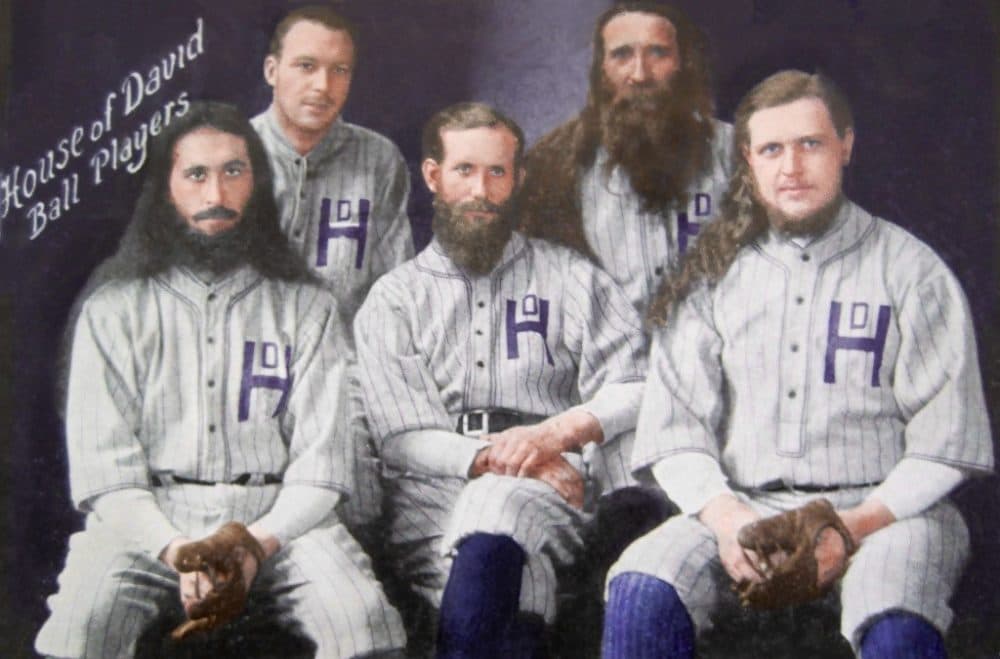
This story re-aired on July 4, 2020. It originally aired on April 20, 2019.
Phil Leece can’t remember exactly when he first learned about the game his father caught for Satchel Paige. It was the ’60s, and Phil was a kid living in Hamilton Dome, Wyoming.
"Smaller than a small town," Phil says. "It's a classic salt-dome oil field about 25 miles west of Thermopolis. And my dad was a pumper."
Phil loved baseball. He’d study the box scores in the Casper Star Tribune and imagine what must have happened on the field.
"You know, if a player only had two at bats in nine innings, I figured, uh oh, they must have pulled him, or he had an injury or something," Phil says.
But in his parents' basement, underneath the stairs, Phil found something that did even more to ignite his imagination.
"There was a pair of cleats and some old, flat baseball gloves," Phil says. "But there's also this jersey. And the jersey said 'House of David.'
"Every time we had a softball game, I would drag out that that jersey, and I'd wear it proudly. It was green in color, and it had, maybe, two-inch block white letters. There's no numbers on the back. Heavyweight cotton with half sleeves. Fit me perfectly to my wrists when I was 8 or 9 years old."
It wasn’t the soft fabric or those big, white letters that made the jersey special. It was the story Phil's dad would tell about the one and only game he played for the House of David — the day he caught for Satchel Paige.
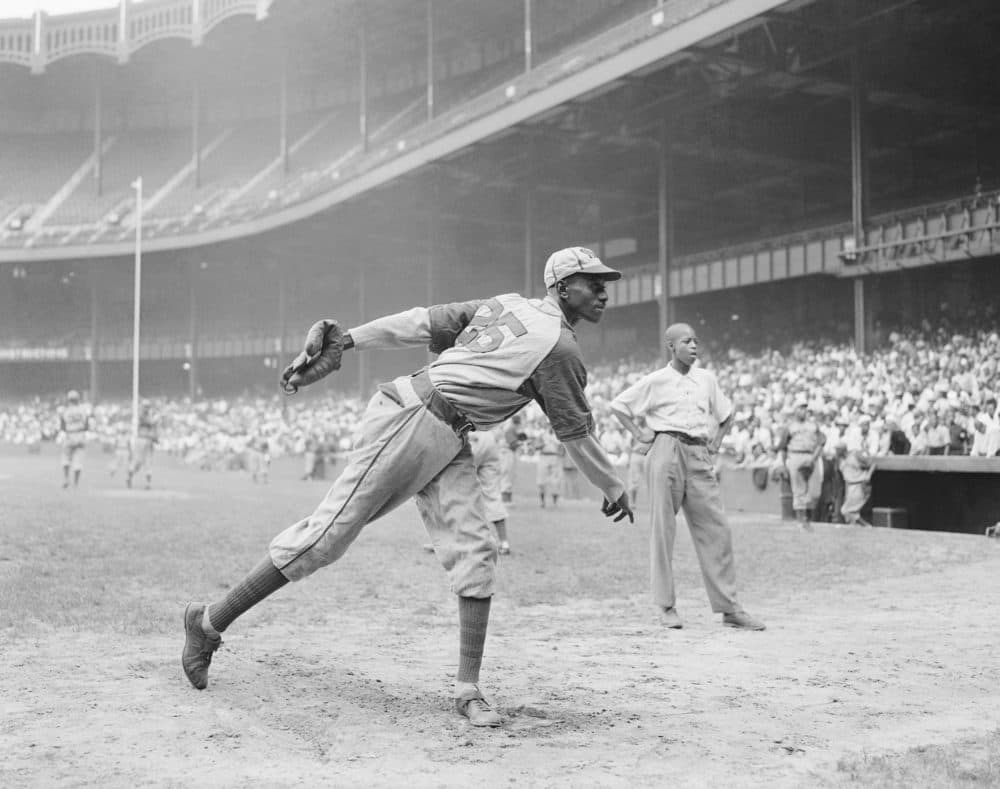
Yes, that Satchel Paige. Paige spent most of his career in the Negro Leagues, not signing his rookie MLB contract until the age of 42. He kept his own records and made the extraordinary claim that he pitched 100 no-hitters over his career.
On the other hand, Phil's dad, George, was an amateur who played for a town team.
George Leece died when Phil was just 17. And Phil never got the chance to ask his dad for details — like, when or where the game was played? Or why George subbed in for Paige’s regular catcher, Cy Perkins?
"He was a little spare on details, to be sure," Phil says. "But he did always point out the fact that Satchel Paige threw with incredible velocity and that his hand had puffed up — you know, had swollen to about an inch thicker than its normal size."
George also told his sons about his teammates from the House of David. They had long, bushy beards and hair that went down past their shoulder blades.
"But there was never any more details until much, much later. 2009, to be exact," Phil says.
But before we get to that, we need to meet another young boy in another small town.
The House Of David
Chris Siriano grew up in Benton Harbor, Michigan. And when he was young, his parents took him to a place called the House of David Amusement Park.
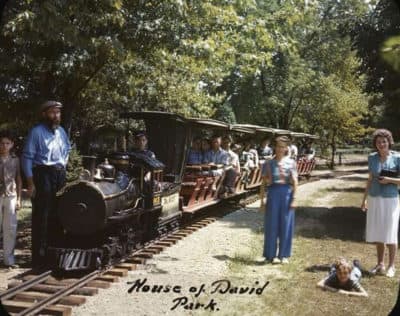
"It was such a cool experience to go there on a Sunday after church and walk up to the big train depot where you got an ice cream cone — probably on a waffle cone, which they invented," Chris says. "You had to board the train to get back into the amusement part, which was about a half a mile in."
But Chris didn't know that this amusement park was attached to a strange religion.
"I had no clue," he says.
After Chris came home from college with a degree in history, he thought it might be fun to tackle a local research project. That’s when he first learned about the people behind that amusement park.
"The House of David was formed by Benjamin and Mary Purnell," Chris says. "They were from Paducah, Kentucky, and they traveled the Midwest as itinerant preachers in the 1890s in a covered wagon. He taught that he was the brother to Christ and the son of God and the Messiah."
When Benjamin and Mary arrived in Benton Harbor in the fall of 1902, they met up with two wealthy businessmen named Louis and Albert Baushke. And, as it turned out, the Baushke brothers were searching for the Messiah.
"So they agreed to join his cause," Chris says. "They donated over $400,000 in cash — which is millions, probably tens of millions today."
Benjamin Purnell preached that his presence on Earth signaled the end of days. But, he said, his followers would never die. They’d live in paradise on Earth.
"In exchange for that promise, you give them everything you own," Siriano says.
Soon, thousands of new followers started arriving from all over the world. They’d turn over their belongings, and Benjamin Purnell would create for them the perfect new job.
And that’s how he ended up starting a baseball team.
"I think he just decided that there was a whole lot of teenage boys and guys in their early 20s with a whole lot of pent-up energy, because they also lived a celibate society — they couldn't have sex," Chris says. "And so Benjamin thought that he should start a baseball team."
With very little to distract them from learning the game, the House of David baseball team, formed around 1914, got very good very quickly. In just a few years, they were being invited to play baseball all over North America.
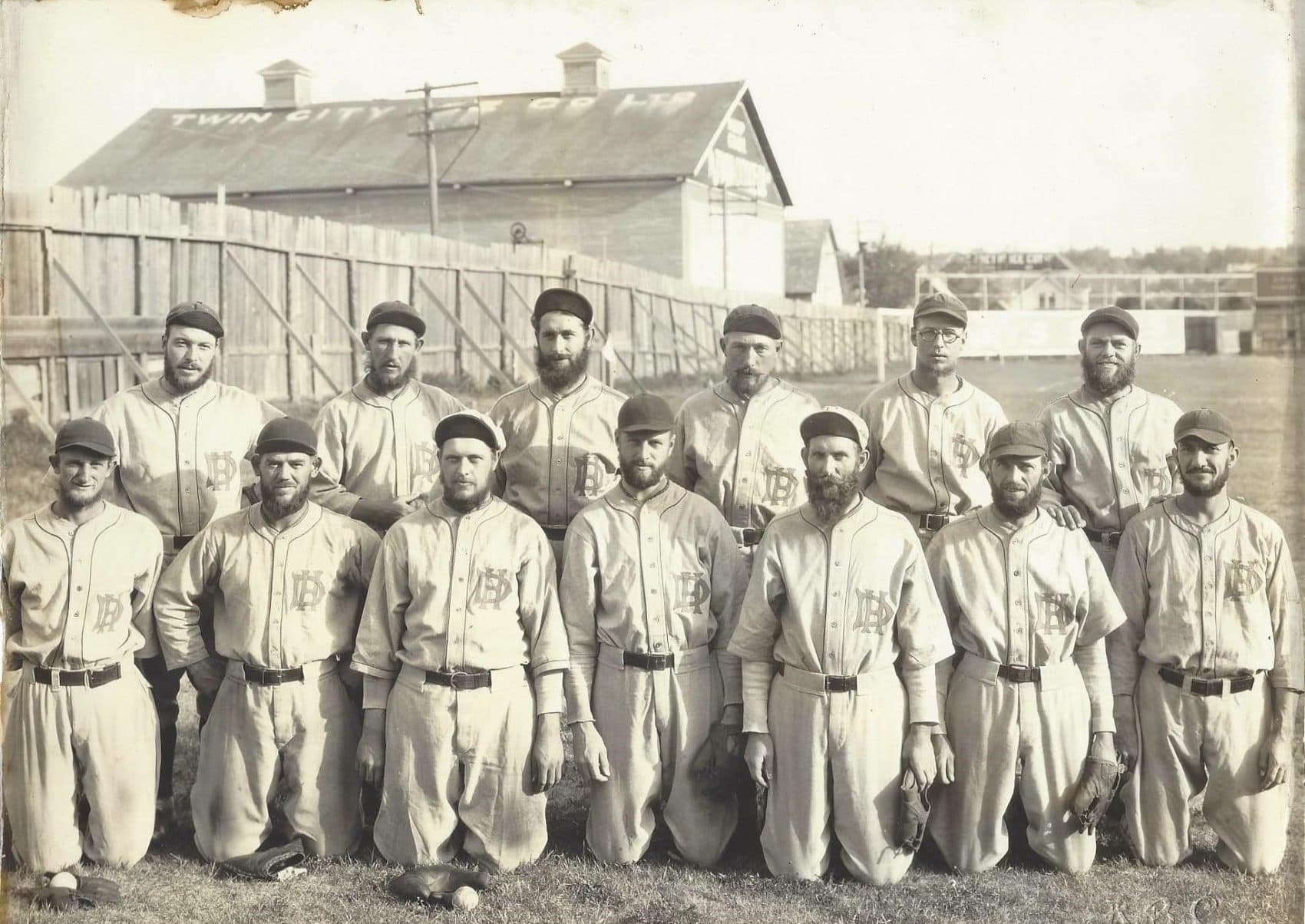
And this is where we get back to Phil Leece and the year 2009. Because that’s when Phil heard a radio interview about one of those invitations the House of David received.
The Denver Post Tournament
By then, Phil was living in Colorado.
"Well, I was commuting home," he says. "At the time, I worked up in Broomfield. Now, I was driving on some pretty bad traffic back to South Denver, and I'm listening to my local NPR affiliate. And they had an interview with Larry Tye."
Larry Tye had just written a book called "Satchel: The Life and Times of an American Legend."
"So of course, the name Satchel Paige caught my interest, and I was listening attentively," Leece says. "And then Larry Tye began speaking of a tournament in Denver. And in 1934, this was a watershed year for the tournament. Because it was the first time that Negro Leagues were invited to play on a competitive basis, not just as an exhibition team."
The Negro Leagues were represented by the Kansas City Monarchs, often remembered as Satchel Paige’s team. But as Phil listened, he learned that Paige didn’t pitch for the Monarchs in that tournament.
"He was coming in with a team from this group called the House of David," Tye says in the interview.
"All of a sudden then, for me, everything just sprang back into life," Phil says. "Because in a single sentence, I had 'Satchel Paige,' 'House of David' and 'Denver.' My father was a resident of Georgetown, Colorado, just up the hill."
Phil immediately went out and bought Larry Tye’s book. He hoped it would lead him to more details about that game his father caught for Satchel Paige — maybe even the box score.
But there’s an even bigger mystery here: How did the greatest Negro League pitcher of all time end up on the mound for a religious cult from Michigan?
Inspiring Baseball Fans, Together
Well, the short answer is that the House of David signed a lot of famous ballplayers to short-term contracts. Babe Ruth even played for them in a game or two.
For the longer answer, we need to go back to Chris Siriano.
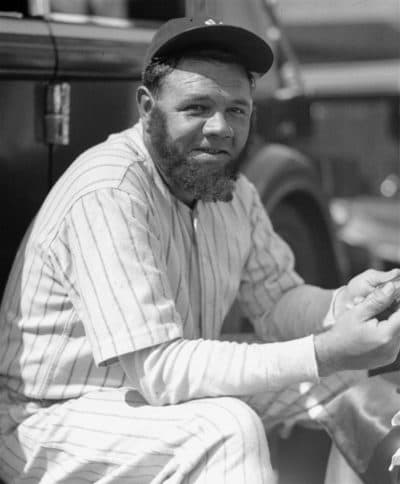
Chris has spent the past 30 years researching the House of David, interviewing members and collecting artifacts. He runs his own museum — the House of David Baseball Museum.
Chris says the team was good enough to play in the Major Leagues. But …
"Part of their belief was that they could never shave or cut their hair," Chris says. "The Major Leagues wouldn't let them play Major League Baseball because you had be clean-shaven. So the Negro Leagues invited them to play with them — because they couldn't play in the Major Leagues because they were Black. So they teamed up together, and they traveled the country in the late 1920s all the way through roughly 1940."
And the team that the House of David would most often travel with was the Kansas City Monarchs.
There’s this one story Chris loves to tell about those days. He heard it from Lloyd Dalager, a House of David member who played from 1926–1940.
"They would travel in two buses," Chris says. "He said, ‘We only pulled into town with one bus.’ "
The other bus, Lloyd said, would wait while Lloyd, his father and another House of David player marched into the baseball manager’s office and said ...
" ‘Mr. Manager, we're so happy to be here in your town, and we're excited and you're going to love us. But here's the deal, sir...’ "
The men would explain that before they played their game that day, the Kansas City Monarchs were going to take the field.
" ‘Never before have you even allowed them into your stadium, much less your town,’ " Chris remembers Lloyd saying. " ‘But sir, they're going to put on a show, and after that, we're going to play. And then after the games, they're going to come to the restaurant with us that we always go to. And we've booked rooms in the hotel that we always stay at. And if you can't make all that happen, sir, the next town past yours is on rain check. So it's fine if you can't make all this happen. We're just going to leave and keep going.’
‘The room would get silent. Sometimes these managers would throw things. They'd punch the wall or where they'd scream at us. Or, you know, they'd leave the room and slam the door. And he said, ‘We'd just stand there.’ "
As Lloyd told Chris, every time, the baseball manager would come back and say that the Monarchs would be allowed to play, but that the House of David should never expect to be invited back again.
"But [Lloyd] said, ‘Guess what, Chris? When the Kansas City Monarchs took the field and started playing baseball, their fans were amazed. And they laughed and they cheered, and at the end of the game there would be a huge standing ovation for how awesome these Monarchs were.’ And he said, ‘Guess what, Chris? Next year they invited us both back.’ "
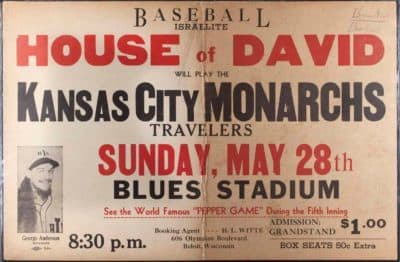
So, while it might seem strange that Satchel Paige was on the mound for the House of David when they beat the Kansas City Monarchs in the championship game of that 1934 Denver Post tournament, these two teams had a long history of working together to inspire baseball fans.
The Box Score
But back to our other mystery. Phil Leece had spent 45 years wondering when and where his father might have caught for Satchel Paige. Could this tournament be the answer?
Phil’s research led him to the microfilm archives at his local library.
"You know, I went through several spools of microfilm," Phil says. "Eventually, though, I found the actual edition of the paper that had the box score of the game that my dad caught. Oh, my gosh. I was just overjoyed. I took cell phone pictures of it. I printed out some blurry copy of it. I couldn't get over the fact that I'd actually found the object of a search that had started essentially in 1964."
Phil found evidence that suggests Cy Perkins was a last-minute scratch, but nothing else that would explain why his father played for the House of David that day. All he could find was a box score and a few lines of copy about the 17 strikeouts Paige threw that night. But remember, Phil has a lot of experience reading a box score and imagining a baseball game.
"It would've been a nice warm evening in August — I saw that in the newspaper weather. It was being played 8:30 at night at Merchant's Park, which means they were under the lights," Phil says. "And I know that stadium lights where this harsh, glinting kind of a blue light. So I imagine what that must have been like. There were 6,000 people in the stands, and my dad would have clipped on the shin guards, chest protector and pulled on the mask. And he was taking a few warm up pitches for Satchel Paige. And I can just imagine how that would have popped in his glove and how it would have stung.
"Dad was 0–4 that night hitting. I'm sure his left hand was swollen so badly he probably felt he was swinging the bat with one hand."
Phil wrote down the story of Satchel Paige, the House of David and the day George Leece played in a game of real historical significance. He bound it into a book and presented it to his family.
"I just wanted them to have a connection to their father, their grandfather and to a time and a place and a baseball game that was a magical moment," Phil says.
But while the number of people connected to George Leece’s story grows with every new generation, the same can’t be said of Benjamin Purnell’s followers. Purnell forbade them from procreating and promised that they’d never die. When Chris Siriano met them, the last remaining House of David ballplayers were in their 80s and 90s.
"They loved, loved, loved their lives," Chris says. "They laughed. I swear they laughed with like a belly laugh, like my grandkids do. And they died and died and died and died and died. And now they're all gone."
This segment aired on April 20, 2019.
